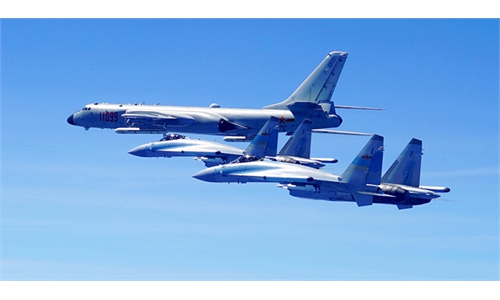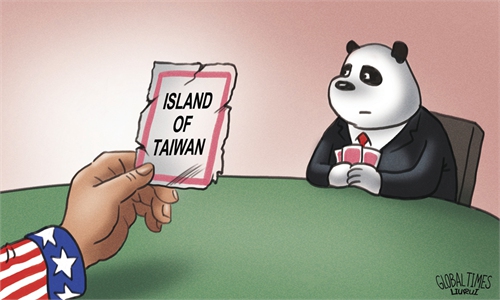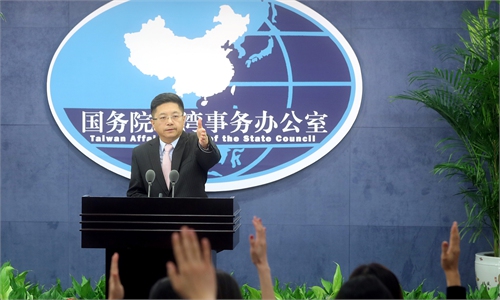US likely to turn Taiwan island into 'bigger nut to crack' in military talks, but secessionists will find it hard to celebrate its 'cannon fodder' destiny

A view of the Taiwan Straits is seen from Xiamen port, in East China's Fujian Province. Photo: IC
As a slew of saber-rattling security meetings between the US and the secessionist Taiwan authorities are expected to start on Wednesday (US time), following the recent China-US dialogue between defense chiefs and senior diplomats, Chinese mainland experts viewed it as a scene for the US to further press the authorities on the island to accept US arrangements for arms sales, or even act as a battle front for it.
Taiwan media said that a delegation led by the head of the "security council" on the island Wellington Koo, is to attend the high-level Monterey Talks next week in Washington, and three working-level meetings of security officials are to be held from Wednesday to Friday as an "appetizer."
According to experts reached by the Global Times, as one of the most important military talks between the Democratic Progressive Party (DPP) authority in the Taiwan island and Washington, the Monterey talks are normally attended by retired or active US military officers, as well as representatives from the American Institute in Taiwan and arms dealers. The three working-level meetings are more about talks on strategic collaboration.
The talks came after Chinese State Councilor and Defense Minster Wei Fenghe's warning at the Shangri-La Dialogue in Singapore on Sunday that the Chinese armed forces will fight to the very end if anyone dares to split Taiwan from China. The talks also came against the backdrop of the Ukraine-Russia conflict, which some US media hyped as offering lessons to intervene in the Taiwan question, which is China's internal affair.
Citing sources familiar with the case, the Nikkei reported on Monday that the key theme in the Monterey Talks would be arms sales and military drills. The media said that Washington, which intends to boost Taiwan's "asymmetric capabilities" against the Chinese mainland's landing operation, prefers to offer the island weapons that are agile, as well as anti-ship missiles, air defense systems and intelligence-gathering systems.
Citing a security official on the island, secessionist Taiwan media on Tuesday said the US Marine Corps recently adjusted its strategy, planning to use "stand-in forces" to conduct rapid deployment to the "first island chain." Taiwan's role in this regard would be a topic during the talks.
Although the Chinese mainland always views the use of force as a last resort for reunification, experts said the media coverage of the arms sales and drill preparations suggests that military collusion between Washington and Taipei is becoming more open, but it is also a signal that Washington is asking the Taiwan authorities to cooperate unconditionally, even if they become "cannon fodder" against the mainland.
For the US, Japan and South Korea could be in its garrison area, or frontline military bases on "first island chain," Chinese military expert Song Zhongping told the Global Times on Wednesday.
The US also has the ambition to include the Taiwan island as a frontline military base to contain the Chinese mainland, but the island is unlikely to have a chance to negotiate with the US over options of weapon sales, Song said.
Xin Qiang, deputy director of the Center for American Studies at Fudan University, told the Global Times on Wednesday that the US has been promoting "integrated deterrence" targeting China, aiming to strengthen the forward military deployment on the "first island chain," and make it decentralized and flexible.
The US already has military deployments in Japan, but so far there's no garrison openly in the Taiwan island, so the talks would be a chance for them to further push possible collaboration, Xin said.
However, it should not be taken as news for secessionists in the Taiwan island to celebrate, as Xin said that "it means that the US is already setting up a hypothetical battlefield and that is Taiwan."
"To put it bluntly, US' purpose for the military talks this time is to discuss how to make Taiwan hold on longer if reunification by force occurs," Xin said. "Since the Monterey Talks are the first since the Russia-Ukraine conflict, the US' next step is probably to turn the island into a bigger nut to crack than Ukraine through arms sales."
The US would figure out how much Taiwan authorities will accept the cruel "asymmetric warfare" it has tailored for the island, whether it is determined to become "cannon fodder" for the US, or whether it is determined enough to make the Chinese mainland pay more by becoming "cannon fodder," Xin said.
In an interview with US media outlet PBS, US Secretary of State Antony Blinken indicated that China is "aggressively" changing the status quo in terms of the Taiwan question, which is "dangerous" and "destabilizing."
He said that China should weigh the cost of "aggression," using the example of the Russia-Ukraine conflict.
Song said it's ironic that the US is blaming China for changing the "status quo" while constantly supporting the "Taiwan independence" forces.
"Continuously strengthening substantive cooperation with the Taiwan authorities is a great provocation to the one-China principle. If the US cannot live up to its word in the one-China principle, it must bear full responsibility for the possible deterioration of bilateral ties," Song warned.
Xin said this time it's different from the relatively low-key Monterey Talks in the past, and the fanfare of the publicity shows that the collusion between the US and Taiwan secessionists has become more open and more brazen.
In talks with National Security Advisor of the US Jake Sullivan in Luxembourg, Yang Jiechi, a member of the Political Bureau of the Communist Party of China (CPC) Central Committee and director of the Office of the Foreign Affairs Commission of the CPC Central Committee, said that the US shouldn't have miscalculations or illusions on the Taiwan question and warned that the Taiwan question, if inappropriately handled, will have a disruptive impact.




